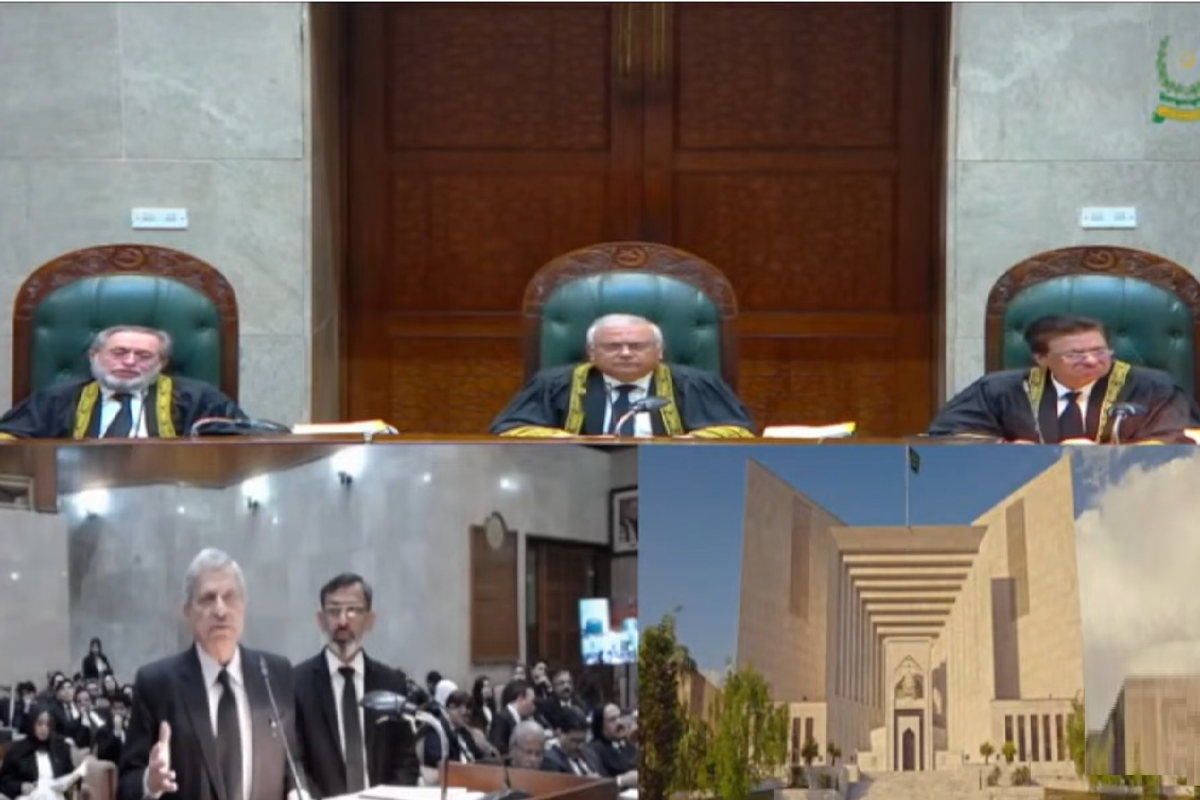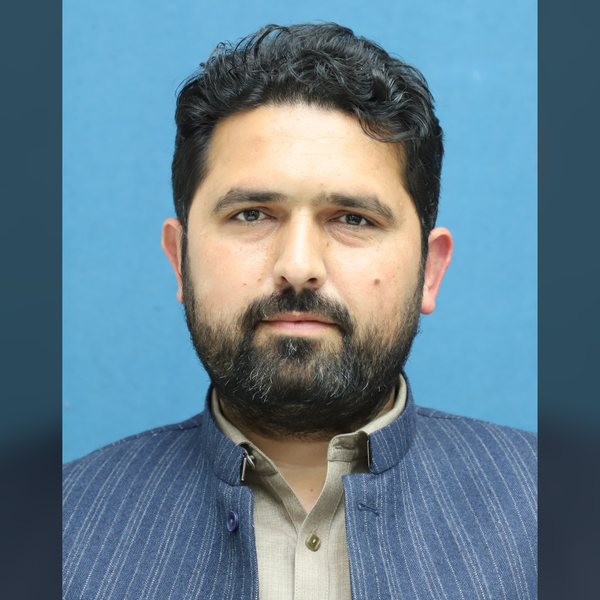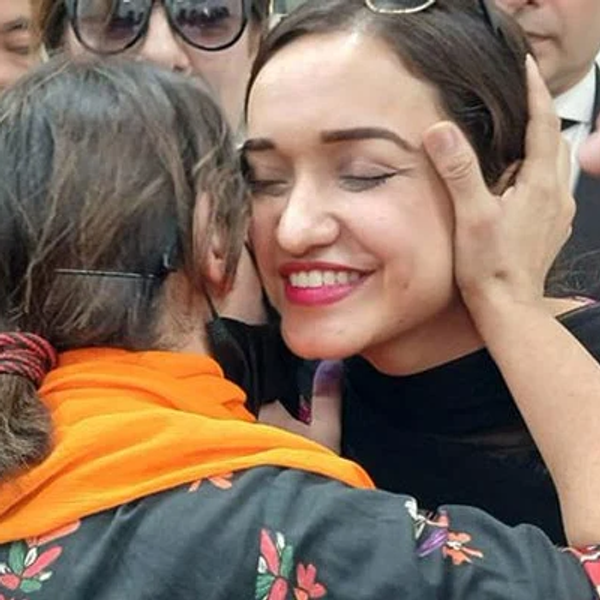Pakistan judges scrutinize plea for full bench in 26th constitutional amendment case
Supreme Court resumes hearing as lawyers present arguments; Justice Muhammad Ali Mazhar notes 'chief justice no longer master of roster' while discussing amendment
Ali Hamza
Correspondent
Ali; a journalist with 3 years of experience, working in Newspaper. Worked in Field, covered Big Legal Constitutional and Political Events in Pakistan since 2022. Graduate of DePaul University, Chicago.

Pakistan’s top court hears the 26th constitutional amendment case on Wednesday, with proceedings livestreamed.
Screengrab
Pakistan’s Supreme Court resumed hearing on Wednesday in a case challenging the 26th constitutional amendment, with judges questioning the legal basis of a petitioner’s lawyer’s request for the matter to be heard by a full bench.
Petitioners argue that the amendment directly affects how constitutional benches are formed, raising concerns over judicial independence. More than a dozen petitions challenging the amendment have been consolidated by the court and around half a dozen lawyers representing different petitioners are scheduled to present arguments as the hearing continues.
An eight-member bench led by Justice Aminuddin Khan took up petitions challenging the legality of changes to judicial powers and bench formation. The 26th Amendment, passed by parliament and signed into law on October 21, 2024, introduced notable changes to Pakistan’s judicial framework.
Key provisions include a new parliamentary committee-based mechanism for selecting the chief justice and a fixed three-year term for the office - measures that have drawn scrutiny from legal experts and opposition parties.
Since its enactment, the amendment has faced multiple legal challenges in the Supreme Court and provincial high courts. Petitions have been filed by political parties, civil society groups and bar associations. The Pakistan Tehreek-e-Insaf (PTI) has sought annulment of major sections, arguing that the law undermines judicial independence and violates the Constitution’s basic structure.
In March this year, over three dozen civil society members questioned the integrity of the parliamentary vote that passed the amendment, while the Lahore High Court Bar and Sindh Bar Council filed similar challenges citing unconstitutionality.
Petitioners argue that the amendment expands executive and legislative control over judicial appointments, compromises fundamental constitutional principles and was passed through expedited procedures with minimal public consultation, raising questions about its legitimacy.
The Supreme Court has been hearing these challenges since late 2024, with the most recent hearing held in the last week of January 2025.
The hearing
At today’s hearing, senior lawyer Hamid Khan - representing the PTI - urged the court to refer the case to a full court of all sitting judges, arguing that the amendment directly affects how constitutional benches are formed.
“We want the full court that existed at the time of the 26th Amendment,” he said, noting that the law was passed late at night and marked the first time in Pakistan’s history that the power to form benches was taken away from the Chief Justice and placed under a new mechanism.
Under the previous system, judges held a majority in the Judicial Commission. After the amendment, administrative and parliamentary sides gained control, putting judges in the minority, Hamid Khan explained. He further argued that the court could exercise its powers under Article 187 of the Constitution to order a full court, citing past precedents where full courts were constituted for constitutional questions and ad hoc judges were included when necessary.
The eight-member bench includes Justices Jamal Mandokhel, Muhammad Ali Mazhar, Ayesha Malik, Hasan Azhar Rizvi, Musarrat Hilali, Naeem Afghan, and Shahid Bilal. The judges repeatedly pressed the lawyer to show the specific constitutional provision that would allow them to order a full court.
Justice Jamal Mandokhel asked whether the amendment is currently part of the Constitution. Justice Aminuddin observed that until the court strikes it down, it remains in effect. Justice Muhammad Ali Mazhar noted, “The chief justice is no longer the master of the roster.”
Justice Ayesha Malik asked, “Where in the 26th amendment is a full court being prevented?” Justice Naeem Afghan added that under the current system, authority to constitute benches rests with the committee created under the amendment, not the Chief Justice.
Justice Mandokhel asked whether Hamid Khan would be satisfied if all Supreme Court judges were recognized as part of the constitutional bench. “The concept of a constitutional bench comes from the 26th amendment,” Hamid Khan replied. “We didn’t give this concept, parliament did. Don’t put it on us,” Justice Mandokhel responded.
Justice Mazhar challenged the lawyer’s reliance on Article 187. “If we forget Article 191A as you suggest, then the constitutional bench itself would not exist. Why are we even sitting here then?” he asked. Justice Aminuddin noted the court might spend weeks only on determining which bench should hear the case, emphasizing that the merits of the amendment were not yet under consideration. Justice Ayesha Malik said the judicial order would allow the process to continue regardless of the decision on bench composition.
Hamid Khan maintained that the amendment undermines judicial independence. “Before the 26th amendment, the judges’ majority in the Judicial Commission ensured protection of an independent judiciary. Now that majority is gone,” he said.
The court adjourned the hearing until Thursday at 11.30 am.
'Important case for the independence of judiciary'
Talking to journalists outside the court, former National Assembly Speaker Asad Qaiser and politician Mustafa Nawaz Khokhar called the proceedings “the most important case for the independence of the judiciary.”
Qaiser alleged that “every fair and unfair method was used to pass this amendment” and said his group, Tehreek Tahaffuz-e-Aain, was working to defend the supremacy of the Constitution. He said they would hold a meeting on October 12 to build support. Khokhar added, “This case is about judicial independence, not individual benefits.”
The hearing was livestreamed on the Supreme Court’s platform. Judges emphasized that only the request for a full court was under discussion at this stage, not the substantive challenge to the amendment itself.
The case is expected to run for weeks as the court decides which bench will hear the constitutional challenge.










Comments
See what people are discussing